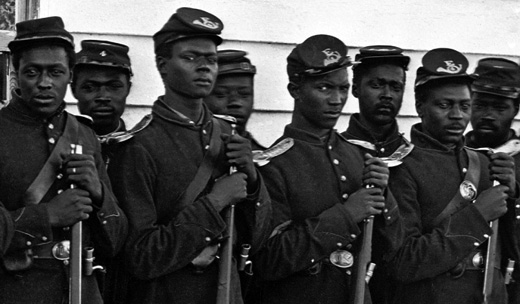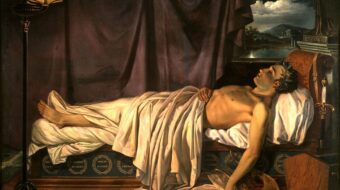
As we celebrate Independence Day, it is worth remembering how important documents are to us – and where the authority for those documents comes from. The 4th of July commemorates the signing of the Declaration of Independence. Other documents – the Articles of Confederation, the Constitution, the Bill of Rights, and so on – literally constitute the nation, say what is and what is not (and who is and can be and who isn’t and can’t be) American (in the sense of the United States rather than the hemisphere).
When the United States was founded, this made the country pretty unusual – though not so strange today. Unlike Germany, Japan, or a lot of other countries, citizenship in the U.S. was not from the beginning fundamentally based on some idea of “blood” (as in “German blood” or the “Teutonic race”) and/or common religion, but on a willingness to accept these documents.
“Blood” and U.S. citizenship
However, “blood” has mattered in two big ways in deciding who is and isn’t, and who can and can’t be a citizen – and who can and can’t be a slave.
First, certain peoples or “races” (Native peoples, Africans and their descendants, and Asians) were judged to be not fully human in the sense that Europeans and their descendants, so-called “white” people or “Caucasians,” were seen to be. As a result, one could steal the land and labor of these not quite people and deny them true citizenship without violating the prime directives of the Declaration of Independence, “that all men are created equal, that they are endowed by their Creator with certain unalienable Rights, that among these are Life, Liberty and the pursuit of Happiness.”
The other way “blood” matters has to do with where the authority for the Constitution, and U.S. citizenship ultimately come from. Unlike Canada, the British government did not grant us independence; we took it. There was no question of the British judging whether or not we “deserved” or were “ready” for independence. The authority for the Constitution and the other founding documents was and is guaranteed by the blood of the patriots who fought and died in the Revolution.
Black people served in the Revolution and all the wars of the United States before (and since) the Civil War. This did not prevent their continuing enslavement in the U.S. justified by an idea of “blood” or “race.” Even in the so-called “free” states, hardly anywhere were African Americans citizens in the sense of being able to vote, have their testimony in trial count as much as that of white people, and so on – and given the U.S. association of citizenship with “people,” to deny anybody the rights and responsibilities of citizenship was to say that that he was not a full person. (I say “he” since women of whatever “race” were not citizens or full persons by those standards.)
African Americans in the Civil War and their battle against slavery
The Civil War was different from the earlier wars in that 200,000 black people officially and very publicly served in the Union Army and Navy, comprising something like 10 percent of the Army by the end of the war. Forty thousand died in the war. This does not count the many thousands of black men and women who served as guides, spies, teamsters, nurses, laborers, and more, for the Union cause.
These African Americans joined the Union military to fight against slavery and for black citizenship. They were highly motivated and generally distinguished themselves by their bravery and discipline, contrary to racist stereotypes of black people common in both the North and South.
African American troops served at great personal risk. Being a soldier in the Civil War, still the bloodiest for U.S. combatants in our history, was dangerous for everyone. But black soldiers knew that if they were captured, they could expect to be executed on the spot or sent into slavery – something their white comrades did not face. They also encountered much racism in the Union army and had to struggle for things like equal pay. Yet they joined. The great poet Paul Laurence Dunbar’s father Joshua Dunbar, who had escaped from bondage in Kentucky and found relative freedom in Canada, came back to the United States to strike against slavery in the 55th Massachusetts Volunteer Infantry and the 5th Massachusetts Colored Calvary regiments.
Black Civil War veterans and defense of Reconstruction
After the war, the rise of Reconstruction saw, among other things, passage of the Thirteenth, Fourteenth, and Fifteenth Amendments (essentially abolishing slavery, outlawing discrimination on the basis of race or “previous condition of servitude,” and guaranteeing the right to vote for native-born and naturalized citizens regardless of race and previous condition of servitude). Racial discrimination and racist ideas certainly did not disappear, North or South, during Reconstruction. Nonetheless, huge economic, educational, and political strides were made. African Americans in the South were elected as sheriffs, city councilpeople, mayors, state legislators, congresspeople, and senators. Black people could justly imagine the beginnings of a nation in which “race” would not affect the quality of their citizenship.
As we know, Reconstruction did not last and eventually a system, Jim Crow segregation, was established in which, once again, “blood” or “race” had everything to do with citizenship. The racist war against Reconstruction was conducted through violence, the ballot box, and culture (novels, poems, essays, cartoons, comics, music, theater, and, eventually, film). As black people fought back, including in speeches, poems, novels, stories, articles, plays, and so on, the black veterans of the Civil War took on a new importance.
Artists and activists like Fredrick Douglass and Paul Laurence Dunbar proclaimed that African American citizenship was not a gift of Abraham Lincoln or any other benevolent white person, but earned through the sacrifice of black Civil War soldiers. Just as the blood of the white Revolutionary patriots guaranteed white citizenship, the blood of black soldiers ensures black citizenship.
They pointed out that when many white people betrayed the Republic, even professional soldiers like Jefferson Davis and Robert E. Lee who had taken oaths to defend the United States, black people answered the call of a country that had held them and their ancestors in bondage. There could be no question of whether African Americans were “ready” for or “deserved” full citizenship, any more than there was for white people; the question had been already settled by the heroic sacrifices of people like Joshua Dunbar. If former Confederates were accorded full citizenship, while those like Joshua Dunbar were denied, then something fundamentally wrong had happened.
Something fundamentally wrong did happen and Reconstruction was largely destroyed – though its ideals and some of the laws supporting it survived, underwriting Brown v. Board of Education and the rise of the Civil Rights Movement of the 1950s and 1960s more than 50 years later. It took the efforts, and blood, of the participants of the black freedom struggles of the 1950s and 1960s to make those laws and documents, and new laws and documents, real.
However, again, on the 4th it is still worth looking back to Joshua Dunbar and the black men and women who served, and in many cases died, for life, liberty, and the pursuit of happiness, in the Civil War. Their blood, even if betrayed by the country they served, still stands as the authority behind the documents constituting freedom and citizenship in the United States and reminds us of the sin of denying such freedom and citizenship on the basis of “race” or “blood.”
“We Wear the Mask,” by Paul Laurence Dunbar
(From “Lyrics of Lowly Life,” 1896)
We wear the mask that grins and lies,
It hides our cheeks and shades our eyes,–
This debt we pay to human guile;
With torn and bleeding hearts we smile,
And mouth with myriad subtleties.
Why should the world be overwise,
In counting all our tears and sighs?
Nay, let them only see us, while
We wear the mask.
We smile, but, O great Christ, our cries
To thee from tortured souls arise.
We sing, but oh the clay is vile
Beneath our feet, and long the mile;
But let the world dream otherwise,
We wear the mask!
Photo: Members of Company E, 4th United States Colored Troops (USCT), on review at Camp William Penn in Cheltenham, Pa., where more than 11,000 black soldiers mobilized for service in the Civil War. housedivided/dickinson.edu












Comments